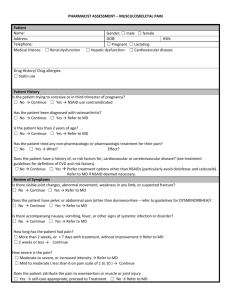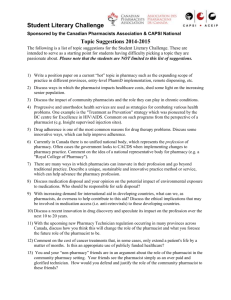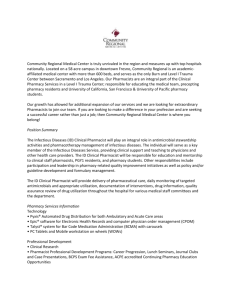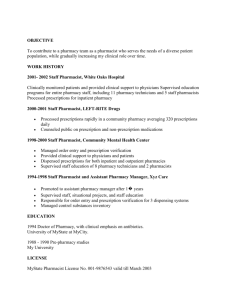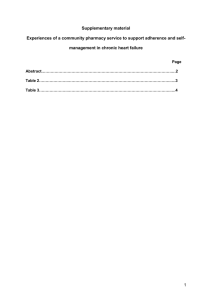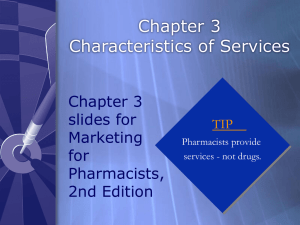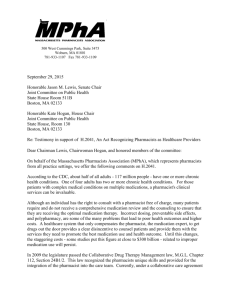Designated Prescriber: Pharmacists
advertisement
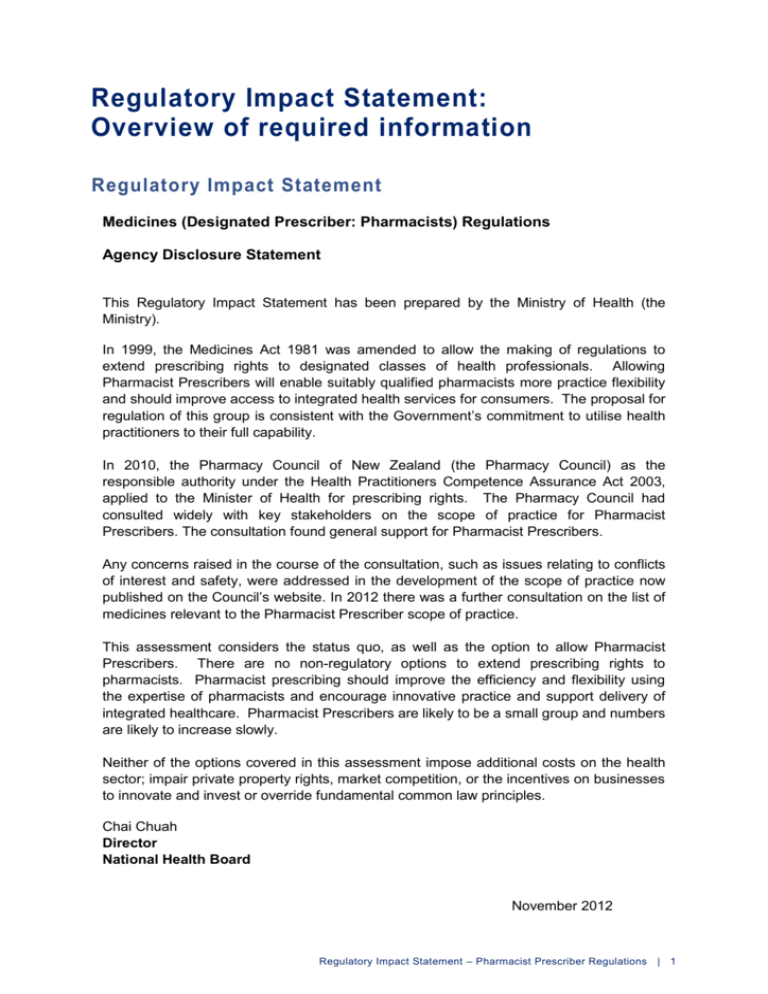
Regulatory Impact Statement: Overview of required information Regulatory Impact Statement Medicines (Designated Prescriber: Pharmacists) Regulations Agency Disclosure Statement This Regulatory Impact Statement has been prepared by the Ministry of Health (the Ministry). In 1999, the Medicines Act 1981 was amended to allow the making of regulations to extend prescribing rights to designated classes of health professionals. Allowing Pharmacist Prescribers will enable suitably qualified pharmacists more practice flexibility and should improve access to integrated health services for consumers. The proposal for regulation of this group is consistent with the Government’s commitment to utilise health practitioners to their full capability. In 2010, the Pharmacy Council of New Zealand (the Pharmacy Council) as the responsible authority under the Health Practitioners Competence Assurance Act 2003, applied to the Minister of Health for prescribing rights. The Pharmacy Council had consulted widely with key stakeholders on the scope of practice for Pharmacist Prescribers. The consultation found general support for Pharmacist Prescribers. Any concerns raised in the course of the consultation, such as issues relating to conflicts of interest and safety, were addressed in the development of the scope of practice now published on the Council’s website. In 2012 there was a further consultation on the list of medicines relevant to the Pharmacist Prescriber scope of practice. This assessment considers the status quo, as well as the option to allow Pharmacist Prescribers. There are no non-regulatory options to extend prescribing rights to pharmacists. Pharmacist prescribing should improve the efficiency and flexibility using the expertise of pharmacists and encourage innovative practice and support delivery of integrated healthcare. Pharmacist Prescribers are likely to be a small group and numbers are likely to increase slowly. Neither of the options covered in this assessment impose additional costs on the health sector; impair private property rights, market competition, or the incentives on businesses to innovate and invest or override fundamental common law principles. Chai Chuah Director National Health Board November 2012 Regulatory Impact Statement – Pharmacist Prescriber Regulations | 1 Status quo and problem definiti on The Medicines Act 1981 (the Medicines Act) provides that prescription medicines can only be sold on receipt of a prescription given by a medical practitioner, midwife, dentist, veterinarian or any other group of health practitioners who are authorised to prescribe by regulations made under the Act. The Medicines Act allows the making of regulations to extend prescribing rights to designated prescribers. The policy objective of extending prescribing rights was to achieve more timely and effective treatment; improved flexibility in the delivery of health and disability services; and better use of the skills of New Zealand’s health practitioner workforce. Regulations can be made under the Medicines Act following consultation with such organisations or bodies as appear to the Minister to be representative of persons likely to be substantially affected by the regulations. Nurse Practitioners and Optometrists are designated prescribers under Medicines Act regulations. Currently the approximately 450 clinical pharmacists, who hold postgraduate qualifications in clinical pharmacy, are unable to prescribe medicines even though they are highly qualified experts in managing medicines. Clinical pharmacists are based in a variety of health care settings providing primary and secondary care, often in established multidisciplinary teams. If used to their full capability, suitably trained Pharmacist Prescribers could play a key role in optimising medicines related outcomes for patients and delivery of better integrated healthcare. Currently clinical pharmacists are most likely to be based in a hospital, rest home, medical practice, hospice or secondary/primary care interface role. It is this group of clinical pharmacists who are likely to train in this scope. In 2010 the Pharmacy Council applied for prescribing rights for Pharmacist Prescribers. Consistent with the role of the Pharmacy Council under the Health Practitioners Competence Assurance Act 2003 the scope was developed for the Pharmacist Prescriber role after wide consultation. Underlying the development of the scope for Pharmacist Prescribers was the requirement to ensure safety for the public as required by the Health Practitioners Competence Assurance Act In the Pharmacy Council’s application it indicated that the cohort of pharmacists most likely to become Pharmacist Prescribers would have: more than five years’ post-registration postgraduate qualifications in clinical pharmacy work in a collaborative health care team status as specialist practitioners. In 2012, fourteen clinical pharmacists, who were required to have a postgraduate qualification in clinical pharmacy and at least three years’ work experience, began training in this new scope. The 2012 course is run jointly in Auckland by the Schools of Pharmacy at University of Otago and University of Auckland. Upon successful completion of the course the students will qualify with a Postgraduate Certificate in Pharmacist Prescribing. The new course is also undergoing evaluation to ensure high quality training that meets the needs of the students. Pharmacist Prescribers will have the right to prescribe any medicine for any condition within their competence from a specified list of medicines approved by the Pharmacy Council. The Pharmacist Prescriber works in a collaborative health team and would not be the practitioner responsible for the diagnosis of the patient but would be responsible for prescribing medicine and ongoing medicine management. The Pharmacist Prescriber, when prescribing, needs to consult first with the primary diagnostician. Each Pharmacist Prescriber will also have a practice plan which provides guidance on their particular area of practice. Regulatory Impact Statement – Pharmacist Prescriber Regulations | 2 Objective To consider whether better use of highly skilled pharmacists by enabling them to prescribe will improve patient access to integrated healthcare and to better health outcomes. The consideration of the Pharmacist Prescriber scope of practice will include: ensuring medicines continue to be prescribed safely and effectively achieving more timely and effective treatment for patients making best use of the skill mix of health practitioners in managing medicines for positive health outcomes. Regulatory impact analysis Issue/Status Quo Currently pharmacists, who are clinical pharmacy experts, working in a collaborative health care setting are unable to prescribe medicines for patients. This situation does not take advantage of the training and expertise of clinical pharmacists. There is the potential to use this expertise for improved delivery of integrated health services. Even when a diagnosis has been made and the pharmaceutical requirements are clear to the pharmacist, there is currently no authority for the pharmacist to prescribe. As a member of the multidisciplinary team, the clinical pharmacist is unable to prescribe even though he/she may provide the advice for the medicines regime prescribed by another practitioner. It would make sense to enable the person deciding on the medicine regime to be the prescriber and would mean that the doctors in the collaborative team would be freed up. The Pharmacist Prescriber role is that of a highly specialised pharmacist. Based on the diagnosis of the medical practitioner, he/she is best placed to choose the right medicine and dosage for patients, particularly those with complex needs. The Pharmacist Prescriber would also be best placed for ongoing management and monitoring of the patient. The status quo is not the preferred option because it does not meet the policy objective. Preferred option To enable Pharmacist Prescribers to have designated prescribing rights under the Medicines Act and the Misuse of Drugs Act 1975 through regulation. There are no non-regulatory options to achieve this. The scope of practice for Pharmacist Prescribers was widely consulted on in June/July 2010. The Pharmacy Council, as the responsible authority for pharmacists, under the Health Practitioner Competence Assurance Act, took account of the concerns raised in consultation in its published scope of practice. Of the 71 submissions, 83 percent supported the proposal and 17 percent did not. Most of these submissions were from medical organisations or individual medical practitioners. The Pharmacy Council’s analysis indicates that where there was a lack of support there was a misconception that the proposed scope was open to all pharmacists. This led to obvious patient safety concerns, where the pharmacist prescriber was not in a collaborative health team environment. Another principle reason for expressing a lack of support for the proposal was the perceived financial conflict of interest of pharmacists both where they would be prescribing and dispensing. These concerns raised in the consultation process are clearly addressed in the published scope of practice as it specifies that: Pharmacist Prescribers are required to have additional qualifications, experience in clinical pharmacy practice, and work in a collaborative health team environment with other healthcare professionals (primarily with doctors and nurses) to optimise medicines-related health outcomes for individuals and populations. They work in partnership with the patient, his/her family/ whanau, caregivers, and healthcare team. Regulatory Impact Statement – Pharmacist Prescriber Regulations | 3 Pharmacist Prescribers must ensure a separation of prescribing and dispensing and must not dispense prescriptions written by them. The Medicines Act enables the making of regulations for designated classes of prescribers. The regulations provide requirements around scopes of practice, medicines to be prescribed, competence, and educational requirements that Pharmacist Prescribers would be required to demonstrate to the Pharmacy Council to show that they are competent to prescribe medicines safely, effectively and unsupervised with a clear understanding of the underlying diseases within their particular area of expertise as defined in a practice plan. The students, who successfully complete the course, will be qualifying with a Postgraduate Certificate in Pharmacist Prescribing in the near future. The evaluation of the course will ensure the high quality training continues to be available to clinical pharmacists wanting to train and register in the Pharmacists Prescriber scope of practice. This option is preferred. Pharmacists are increasingly being recognised as being able to make a greater contribution to patient care plans, to provide proactive management of pharmaceuticals and to ensure greater integration with general practitioners with the primary care services team. The Government has a focus on improving services for patients. Extending prescribing rights to Pharmacist Prescribers aligns well with fully utilising this expertise. It will also free up the medical practitioners in the team to undertake other work which utilises their skills. The regulations would: i. authorise the Pharmacy Council to specify the qualification, training and competency requirements practitioners must meet before registering in the pharmacist prescriber scope of practice and any on-going training and competency requirements for this scope ii. prohibit any pharmacist prescribers who fail to comply with any of the competency, qualification, training or knowledge requirements from prescribing and make it an offence for them to do so iii. determine the schedule of prescription medicines and controlled drugs that pharmacist prescribers may prescribe. The Pharmacy Council as the responsible authority will require individual Pharmacist Prescribers to demonstrate competence to prescribe medicines safely, effectively and unsupervised, with a clear understanding of diseases and their medical management iv. authorise prescribing from a schedule of prescription medicines and controlled drugs by a pharmacist prescriber who meets the qualification, training and competency requirements specified by the Pharmacy Council. Competence and Training The Pharmacy Council is the responsible authority under the Health Practitioners Competence Assurance Act. As such the Pharmacy Council will require that a pharmacist, seeking to register in the pharmacist prescriber scope of practice, demonstrates competency to prescribe medicines safely, effectively and unsupervised, with a clear understanding of underlying diseases. Pharmacist prescribers will be required to: i. hold an Annual Practising Certificate in the Pharmacist scope of practice; ii. declare that competence standards 1, 2, 4 and 5 (from the Pharmacist scope of practice) forms part of their current practice; Regulatory Impact Statement – Pharmacist Prescriber Regulations | 4 iii. have at least three (3) years of recent, appropriate and relevant post registration experience working in a collaborative health team environment iv. have completed the Pharmacy Council’s accredited course of education and training; and v. have evidence to identify and support that their prescribing practice occurs in a collaborative health team environment As part of the accreditation of training and qualifications for pharmacist prescribers, the Pharmacy Council will ensure that the programmes give sufficient coverage to required aspects of the prescribing process. Each year a Pharmacist Prescriber will be required to provide ongoing evidence of competence before being issued an annual practising certificate. Clinical pharmacists registering in the Pharmacist Prescribers scope would already be regulated by the Pharmacy Council and this change of scope will not substantially add to the Pharmacy Council’s responsibility to ensure safety required under the Health Practitioners Competence Assurance Act. Medicines to be Prescribed Subject to Cabinet agreement to the making of regulations, the Pharmacy Council will gazette the scope of practice for Pharmacist prescribers. The Pharmacy Council has consulted on and determined a list of medicines able to be prescribed for inclusion in the regulations. The Pharmacy Council will be responsible for keeping the Pharmacist Prescriber list of medicines updated. The list has been reviewed and approved by Medsafe and will be included in the regulations. Those medicines able to be prescribed will be specified for each individual pharmacist prescriber in their own Practice Plan. The Plan relates to their defined area of practice taking into account management of the patient’s care within the collaborative health team. PHARMAC will consult on adding Pharmacist Prescribers to the prescriber lists in the Pharmaceutical Schedule, so that their prescriptions are able to be subsidised. Statement of net benefit of the proposal Government An efficient and readily accessible health system is a priority for the Government and will benefit all New Zealanders. Pharmacist prescribers as medicines experts should contribute to improved access to health services and better medicines management for patients. Initially the number of pharmacist precribers will be small and it is expected that up to 20 clinical pharmacists per year may potentially train for a Postgraduate Certificate in Pharmacist Prescribing. The Pharmacy Council will pass costs on to practitioners registering and practising under the pharmacist prescriber scope of practice by charging fees for registration and the issuing of annual practising certificates. As for other registered health practitioners, District Health Boards (DHBs), as employers of Pharmacist Prescribers, are likely to meet costs for some of the training and ongoing competence requirements for Pharmacist Prescribers. Other employers are also likely to meet the costs for practitioners, depending on employment arrangements. PHARMAC PHARMAC has indicated that changes would be required to the Pharmaceutical Schedule to enable funding of scripts written by Pharmacist Prescribers. The process to change the Regulatory Impact Statement – Pharmacist Prescriber Regulations | 5 Schedule may require consultation. As part of the Pharmaceutical Schedule change process PHARMAC would undertake analysis to forecast the Combined Community Pharmaceutical Budget. Since initially there are only fourteen practitioners likely to be given prescribing rights the financial impact of expanding funding to include scripts written by Pharmacist Prescribers is likely to be small. The numbers registering in this scope is likely to increase at a maximum of 20 per year. These pharmacists are required to have postgraduate qualifications for clinical pharmacy and at least three years working as a clinical pharmacist. These requirements are expected to limit the size of the intake. In addition, since the Pharmacist Prescriber is likely to be prescribing for a patient who previously would have received the prescription from the medical practitioner, in theory it seems likely that the number of prescriptions would remain similar. Ministry of Health There will not be any cost associated with changes required to systems to enable the monitoring of expenditure of Pharmacist Prescribers. Other stakeholders Cost to practitioners The initial cost to practitioner would be the fees for training. These are: Course Fees Auckland University $4,461 Otago University $4,600 New graduates employed in a private practice may have to meet the costs of the annual practising certificate (APC), depending on employment arrangements. The Pharmacy Council has indicated that this is likely to be similar to the general scope pharmacist APC. There will be a small one–off cost for post-qualification pharmacy registration in the new scope of practice. This cost is also likely to be met by the employer. Pharmacy Council The Pharmacy Council costs are already met through fees from pharmacists as part of the APC. Seven of the fourteen trainees are hospital-based clinical pharmacists. DHBs will already be paying for the APC and the Pharmacy Council has indicated that there will not be a significant increase. Cost to Society The extension of independent prescribing rights to Pharmacist Prescribers will encourage more flexible and efficient ways to deliver health services as the need for multiple referrals between practitioners may be reduced. Extending prescribing rights may also: Reduce secondary illnesses, complications and hospital admission Result in cheaper primary health care for patients who currently need to be referred to a medical practitioner for a prescription and may reduce the number of health practitioners required to be seen Be simpler and cheaper for the patient and provide for a far better care experience if they can receive treatment from a medicines expert for their medicines management. Regulatory Impact Statement – Pharmacist Prescriber Regulations | 6 Consultation The Ministry of Health has discussed the content of this analysis with The Treasury, PHARMAC, Medsafe, and has informed the Department of the Prime Minister and Cabinet. There has been a full consultation by the Pharmacy Council on the ‘Proposed Pharmacist Prescriber Scope of Practice’ undertaken in June 2010. Groups consulted included professional groups, a wide range of government agencies, responsible authorities and interest groups. In August 2012 the Pharmacy Council also consulted on a list of medicines required to be included in the regulations to enable pharmacist prescribing. This comprehensive consultation sought input from the pharmacy profession and key stakeholders with in-depth knowledge of medicines and their therapeutic use. These stakeholders included pharmacy organisations, academic and teaching institutions, medical organisations, regulatory authorities, PHARMAC, Medicines Control. A total of 71 submissions were made in the 2010 consultation. Overall, submissions were supportive of the scope, with 39 percent of respondents supporting the proposed scope as presented, 44 percent supporting it with modifications and 17 percent not supporting the proposal. Predominantly the modifications related to further clarification of the definition of a “collaborative health team environment”; the communication and recording of clinical decisions; the registration requirements and aspects of the education and training for these pharmacists Medical organisations. Most of the submissions that did not support the proposed scope were from individual medical practitioners or medical organisations. A number of these unsupportive submissions appeared to be based on an assumption that all pharmacists would become prescribers. This assumption is incorrect since only clinical pharmacists would be able to become Pharmacist Prescribers and there are currently about 450 out of 3,220 practising pharmacists with a clinical qualification. Of this cohort of 450 clinical pharmacists, those choosing to qualify as Pharmacist Prescribers are unknown, but due to the highly specialised nature of the role, the number is unlikely to grow quickly. Other reasons for a lack of support included a perceived conflict of interest relating to the financial relationship between prescribing and dispensing and concerns relating to the level of education and training of pharmacists in diagnosis, physical examination and clinical assessment of patients. The Pharmacist Prescriber in the collaborative team is not the primary diagnostician, and this is clearly stated in the scope. In the second consultation only one respondent did not support any form of non-medical prescribing. Financial conflicts The proposed pharmacist prescriber scope of practice states that pharmacist prescribers must ensure a separation of prescribing and dispensing and must not dispense prescriptions written by them. The Pharmacist Prescriber must work within the scope or risk facing possible disciplinary proceedings under the Health Practitioner Competence Assurance Act 2003. Pharmacists are also bound by a professional code of ethics. Regulatory Impact Statement – Pharmacist Prescriber Regulations | 7 Financial conflicts of interest are not anticipated to be an issue with pharmacist prescribers. Regarding pharmacy ownership, the Ministry of Health as the Licensing Authority has sole jurisdiction to consent or not consent to prescribers holding an interest in a pharmacy under section 42C of the Medicines Act. The published pharmacist’s prescriber scope of practice and the list of medicines has taken full account of the concerns raised in the consultations by both clearly stating that to work in this scope the Pharmacist Prescriber must work in a collaborative health team and must ensure a separation of prescribing and dispensing. Conclusions and recommendations The above regulatory impact analysis provides information about the benefits and costs associated with two options. It is recommended that regulations be made under the Medicines Act and the Misuse of Drugs Act to extend prescribing rights to suitably qualified pharmacists. There will be minimal cost implications for this proposal. The main costs will be for practitioners, who train as Pharmacist Prescribers independently of their employer. The compliance costs for the regulation such as APCs and ongoing competence requirements for Pharmacist Prescribers are likely to be paid by employers to the Pharmacy Council. These costs are likely to be small with a small number (14 practitioners) who if as expected successfully qualify as Pharmacists Prescribers in 2012. The number qualifying will potentially increase slowly by up to 20 annually. The Pharmacy Council has ensured that pharmacists have been kept well-informed on the progress for prescribing rights. Implementation New regulations will need to be drafted under the Medicines Act and the Misuse of Drugs Act to allow pharmacists to prescribe. Monitoring, evaluation and review The evaluation to date has provided valuable insights into the training programme for Pharmacist Prescribers – what works well and what can be improved. The final evaluation will include information from the interviews with the Pharmacy Council, course developers, students, and the designated medical prescribers who supervise the students. There is general agreement, thus far, across all parties that the competencies and standards for pharmacist prescribing are appropriate and that the programme of study and assessments provide assurance that graduates will be safe and competent prescribers. Once Pharmacist Prescribers are registered in their scope of practice by the Pharmacy Council, the normal processes to ensure ongoing competence will be required to protect the health and safety of members of the public as required under the Health Practitioners Competence Assurance Act. The Pharmacy Council already fulfils this function for these pharmacists and is well placed to monitor those working in this new scope. The Ministry will monitor the changes and report to the Minister of Health on any issues that arise. Regulatory Impact Statement – Pharmacist Prescriber Regulations | 8
